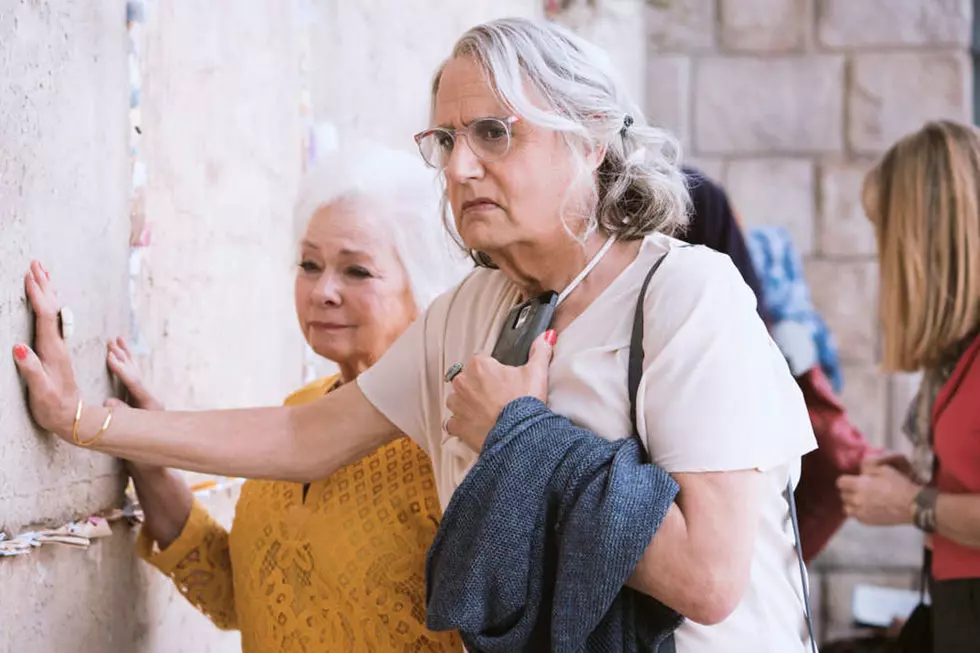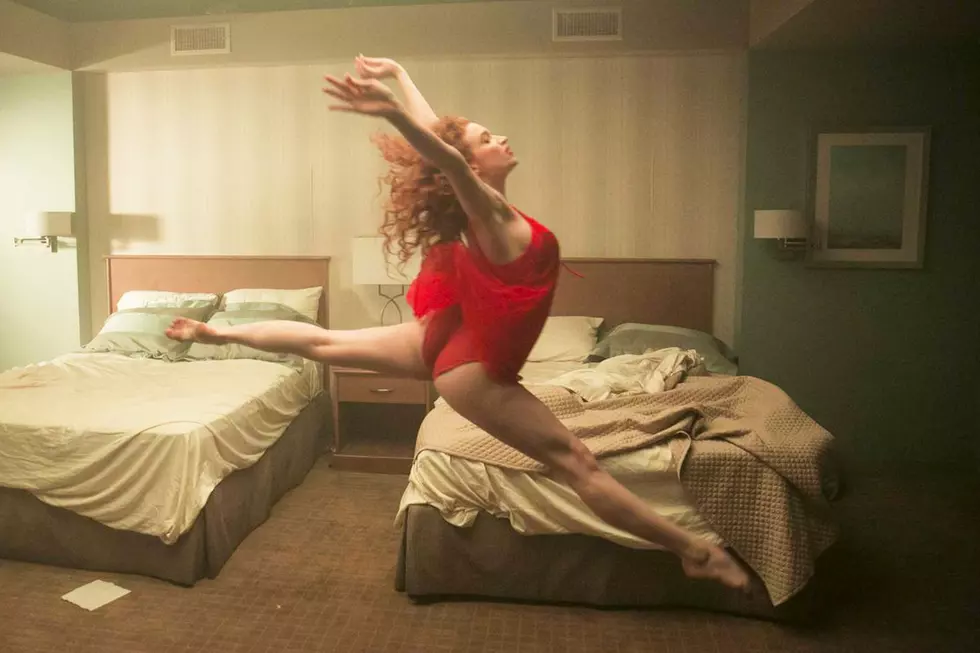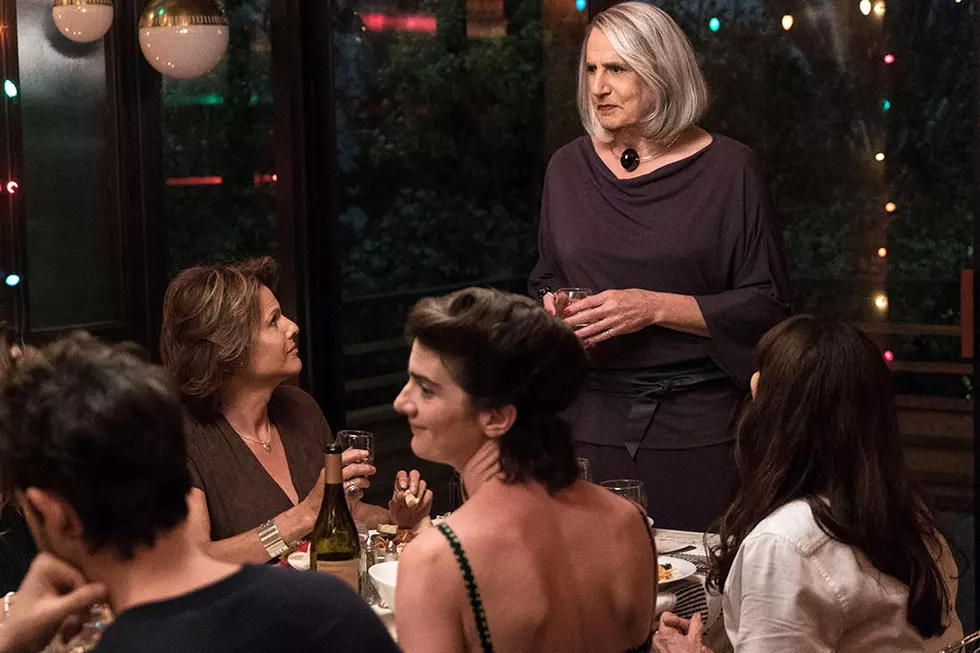
Jay Duplass Interview: ‘The Do-Deca Pentathlon”
Filmmaker Jay Duplass works as one half of a writing and directing team with his brother Mark. The pair became known over the last decade for their smaller films that were low on budget but packed with heart.
In recent years they've hit the mainstream with films like 'Cyrus' and 'Jeff, Who Lives at Home.' We spoke to Jay about their last micro-budget film, 'The Do-Deca Pentathlon,' a story of two brothers who revive their childhood Olympic-style games to determine who is the best brother once and for all.
I just talked to your brother Mark a couple of weeks ago.
Cool!
He was so hilarious to interview, just so you know.
I'll try and live up!
Where did you get the inspiration for 'The Do-Deca Pentathlon'? What brought you to this particular story?
The Do-Deca Pentathlon is actually a real competition that two brothers who we lived down the street from created when we were in high school, to determine who was the better brother -- not the better athlete. That's really a small... It's like, really, who's the best? Mark and I have been obsessed with it ever since. It wasn't until we kind of came up with the idea that two older brothers would kind of, like, reignite the competition -- two older, estranged, and most importantly, out of shape brothers would reignite the games over the course of a weekend -- we started getting super excited about the possibility of making a movie about it.
The two brothers in the film are on opposing ends of a spectrum with their own ideals and goals, or lack thereof. Did your own relationship with your brother inspire any aspects of the fraternal relationship in the film?
Not particularly just because Mark and I are incredibly similar, on the scale of what these guys are like. We're pretty similar. We both work really hard, very achievement oriented, very family oriented. Mark and I have always been super close. I think we're almost obsessed with brothers who aren't and find it to be tragic and hilarious in the way that we totally like to make movies, I guess? There's something incredible about... Your brother's always going to be your brother, whether you don't like him or not, and they're always gonna be showing up at family events, and they're always gonna know a lot about you, you know? We all grow up and we wanna create these new selves and stuff, and I think that's great, and I think that does happen, but there's also this part of you that will always be the kid that you always were, and your siblings know who that person is, and you may or may not wanna be reminded of that. Usually not. But in a weird way it's like, your brother knows you better than your spouse knows you sometimes, or your sister, you know what I mean? There's something incredibly powerful about that and it's funny -- there's something funny about it too.
You both have a very special skill when it comes to observing small moments between characters, especially moments where people in a relationship are bickering. I feel like those moments ring so genuine...
Oh god, that's so nice to hear.
It's almost frightening. Like I've had that argument before! And that's how it ended! How do you approach those moments so deftly?
We just do them truthfully as we have experienced them and as our close friends and loved ones experienced them. It's interesting because we have a term that we call those moments, we call them "epically small" just because we've noticed that the epic moments in our life seem to emanate from a fight over which olives to buy in aisle 12 at HEB. You know what I mean? That has been the moment that made me realize I didn't wanna marry this girl, or whatever -- it's f---ing insane, but that is, those are the moments that bring things to the surface. We find our lives to be populated by those moments, and so that's just what we do, and when we do it we just do it completely truthfully and we don't really try to stray or movie-ize it too much. We do things, like you had said with the two brothers, we'll take them and make them character-wise polar opposites so that when they show up on the day, you don't wanna have to like, jack-up the drama, and jack-up the comedy. It's built well.
But it's nice to hear when people say, "It sounds like you had a tape recorder in my bedroom" -- that's kind of our greatest compliment because I think we feel like now that is what we have to offer, these really honest, genuine moments. 'Cause our plots aren't that big, you know? The worst thing that happens in one of our movies is that somebody gets their feelings hurt really badly. That's our idea of a high drama, so dramatic bar is low, and because of that I think our movies kind of depend on the audience feeling extra engaged in the truthfulness of it, almost kind of forgetting that it's a movie with the doc style and the moments that feel like your life, I guess. Buildings aren't comin' down, no dragons are threatening to destroy society, it's very small stuff.
Your micro-budget films especially all have that very intimate, fly on the wall feeling to them. How do you keep that voyeuristic feel without veering into something that may seem too forced or melodramatic?
The main way that we do it, and this all evolved out of accidents and luck, but it kind of evolved from we were going to this Meisner acting class on the east side of Austin 12 years ago, run by this guy named Ron Hayden and every night there would be like, 15 interactions and a lot of them were boring, but every night there would be two or three interactions that were improvised interactions between two students that were so electric and so honest and weird, and you didn't know what was gonna happen. And I remember thinking at the time, I need to put a camera on this, like I need to stop, I need to get out of my trying to be the Coen brothers mentality, and just put a camera on this. So we started creating scenarios, like in a karaoke room, for instance, and I would just light the whole room to be available so that the actors could just go where they wanted, do what they wanted, say what they want -- just have a truthful interaction, you know, obviously with our scripts based on what the point of the scene is and what each character wants in that scene. And then I just started filming it like a documentarian would, trying to get in the best spot, moving over, zooming in, trying to catch the moment. People are like, "Why are you moving around and zooming?" And I'm like, 'cause I don't know what's gonna happen!
I think that's how it happens, is that I, personally -- even though I've written the script and I'm shooting it and I'm working with Mark and I'm shooting it -- it's uncontrolled in a way that often makes studios and actors uncomfortable, and crew members uncomfortable, but it's the only way we know how to get those genuine moments.
Do you encourage a lot of improvisation?
Every take. Every time. Don't even direct the first take if they're okay with because, you know, you start directing and people get in their heads, get a bunch of ideas about what it should be. I'd say a third of what we put on screen is a first take, where we walk into a room, you're dealing with some very intelligent human beings who have their own desires and creative urges, and there's that feeling of nervousness and that anything could happen, and no one knows what's gonna happen. At least a third of the time that's the best take.
How did you choose which events to include in 'The Do-Deca Pentathlon'? Were all of them taken from your neighbors, or did you make some up?
To be completely honest it was based on what we could get access to at the budget level in our hometown for the two days that we had to shoot. We shot the whole Do-Deca in two days. It was f---ing insane, you know? This movie is like a Will Ferrell/Vince Vaughn movie that is basically being made for no money, with feelings. It's like a giant, dork-out, balls comedy. The Farrelly brothers could have easily directed a very different version of this movie. It was a hard movie to make in the sense that Mark and I found ourselves a bit in over our heads. I guess we were growing and expanding as filmmakers, but we were still doing it at micro-budget level. It was a hard film to make.
Did you guys do any of the events yourselves, for fun or friendly competition?
Hell no.
So lazy!
We did, one time. People have heard about me and Mark's ping pong thing.
You have a ping pong thing?
It's real. We have a ping pong thing. We played ping pong growing up with our parents our whole lives, and I'm not gonna lie -- we're really f---ing good. Bragging about being good at ping pong... you can't. It's almost like a negative thing, if you're actually good at ping pong. But we're really, really good and people find out about it and they want us to play. It's actually incredibly stressful for us to play against each other because, first of all, you have to get really, really up for it. It's a big deal. It brings back all this old stuff, but more importantly, we love each other and I don't want... It's like you can't win, in a weird way. There's so much involved in it. I don't wanna slam a ball and it hits him in the chest and he feels embarrassed and weird. And the other thing is that even if you win, you know the next time you play he's gonna come back with a vengeance so you have to defend your title. It's f---ing insane! It's just ping pong, you know, but we're kind of obsessed with it.
So we did play ping pong and everyone in the crew was watching and it was very, very intense. We played at my parents' house on the original table that we grew up with.
That's cute.
Yeah, it was stupid and fun.
How did you cast the roles of the two brothers?
Those two guys are guys that we were really close with, who are actors in LA... Steve [Zissis], the family guy, is a guy we went to high school with and grew up with, and Mark Kelly has just been a friend of ours for a long time in LA. It's hard to say. We just thought that they felt like brothers, like they came from the same place. They grew up with brothers, they both grew up competing in this way. They got it. And they had that incredible combination of being great actors, really sensitive, open, amazing guys, and being really f---ing good athletes. The funny part about Steve, the chubby guy, is we were all worried about like, how is he going to take all this running? There's so much running! And we were kind of worried, but he wasn't saying anything and when we shot the first 5K scene, he came blazing down the lane because he's ex-athlete -- obviously you've seen him playing basketball, it's like, oh my god, that guy's a baller. He's like a 240 pound Greek baller.
Ross, our co-producer, leans over to us and goes, "I knew that motherf---er was gonna be fast!" He was almost, like, angry. He's like, fat and he's fast?! Damn, this dude doesn't let go of anything! It was fun, but yeah, they had that perfect combination.
They really do feel like brothers, and the thing about Steve is that -- besides being concerned for his health during the sporting events -- you're concerned because it's building up to his inevitable total breakdown. He talks about it, it's mentioned a lot, but I like how he's responsible for his own undoing and he can't even blame Mark.
No, you can't. I think my favorite moment in the movie is when -- my personal favorite -- is when you're wondering what's going on with him, like what is going on, and is this really dangerous for him? And does he really turn into a monster, or is it fun? What is it? And you're starting to wonder if the wife -- is she really looking out for him, or does she just got a stick up her ass? What's going on? And then at a certain point he's like, "You're gonna leave because I'm gonna play sports with my brother?" And she's like, "No, I'm gonna leave because you're being an a--hole." And you're like, oh my god, he is an asshole. He's turned into what she said he was gonna turn into all the time, and she was right. And the whole thing is very easy for people to get on board with this rebirth, and playing sports, and I'm gonna come back alive as a human being. Part of that is true.
The other part is that it's not really... It starts out joyful and exciting, and then it just goes to this dark place. Kind of like with Mark and I playing ping pong. There's a lot of fun in it, but by the time you're an hour into playing ping pong, you're just tense and scared and angry. You just wanna kill that person, but you're just trying not to be killed. You're reduced to this neanderthal state, which I don't think we even explored. We didn't talk about any of that stuff, that deep in the movie. I don't know if people are picking up on that as much, but that's something that I have always felt with sports and with competing with my brother. It brings you back alive, but it makes you a monster.
It makes you very primitive.
It makes you primitive, yeah.
There's something that definitely comes of out Steve that is not quite human anymore.
Yeah, you play against your siblings -- even with board games, you know? You ever go to a board game hangout with friends and then you're on your way home and you're like, "What the f--- did I just do in there?" You were screaming and yelling at your best friend across the table? What? Everyone goes home kind of embarrassed and like, worried.
That's what alcohol is for, though. You all make up over a few drinks.
Exactly. You're right, you're right.
Something I really liked in the film is that as much as Steve is painted to be this a--hole, and a lot of times in movies it's easy to think the wife should leave or get a divorce, it's not handled that way here. You can see why they're together, and it shows how relationships are complex and individual. You guys are awesome at finding that gray area.
Thanks, we love all of our characters and people are always like, "How do you keep it all in play?" And it's just like, we just love all our characters and we honestly don't judge them, you know? They're all f---ed up, and they're all trying their best. That's why it's funny.
It's more relatable, too. You guys finished this film in 2008...
Yeah, it was shot then.
Was there ever a point when you worried about completing it, or that it might not get done?
No, 'cause I knew it was good. I knew we'd come around to it. It got scary, I got worried about it for a little while. I don't know if you know the story, but we basically started editing and then we got greenlit for 'Cyrus,' so we were like, s---, we have to go, we have to do this. And most of the people -- everyone who was working on the post of it came over to 'Cyrus,' and we were like, we'll just finish this as soon as we're done with 'Cyrus,' and then we got greenlit for 'Jeff, Who Lives at Home' right after 'Cyrus.' While we were making 'Jeff, Who Lives at Home,' and you know our movies do take a while to make 'cause our post is long because we're doing a documentary edit, basically with all the improvised footage... While we were editing, Mark and myself and our editor Jay Deuby [said] we gotta do 'Do-Deca' because we might get another movie, who knows what'll happen. Basically right when we finished editing 'Jeff' we kind of booted up the old hard drives and brought the project back up on our laptops and started finishing it again. It's amazing how fast four years went by.
Do you have any plans for any more micro-budget films, or are you done with that now?
We don't have particular plans. What we do is that we just write and work up ideas. The good news for us is that a lot of our movies, like 'Cyrus' we made at a studio. We could have made 'Cyrus' for $100,000. That's probably our smallest movie, in scope, but when you make it at a studio it costs $7 million. You don't understand why, it just does.
All that marketing!
Yes, marketing, and red tape within a studio. It's actors' salaries and union minimums -- all that stuff. We do have some exciting ideas about making some really low budget movies with some really big movie stars. That's something that we've been blessed with is that a lot of movie stars are excited about what we're doing. I think it has to do with the fact that it's pretty clear when you look at our movies, all we care about is story and acting. We spend a lot of time on it, there's a lot of exploration and people are excited about that. That's one model that we're kind of excited about, but we will continue to make studio films and little movies, too.
More From ScreenCrush









